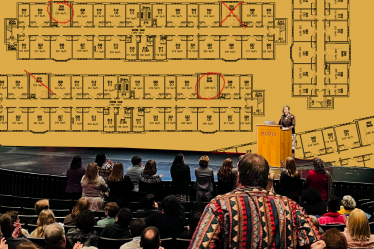Laura Haley
Chief Copy Editor
Students representing various campus organizations gathered at a planning meeting held by the Student Government Association (SGA) on the evening of Monday, Feb. 5 to express concerns they wanted SGA representatives to relay to the Board of Trustees during the Board’s March meeting.
The meeting, run by SGA Vice President Jordan Ouellette ’18 and Campus Council Vice Chair Marina Adams ’18, was like others that SGA hosts once a semester to prepare for a “student development meeting” with Board members.
“At this meeting, we as students get to express things that we think the trustees don’t know about what’s going on on campus, concerns or something positive [to] let them know what groups are doing,” said Ouellette.
This year, instead of each organization articulating their specific concerns, representatives from organizations with similar concerns were placed into smaller groups to talk together about the concerns they wanted to raise.
With over 10 student organizations represented, members were able to share their uncertainty over several issues.
Myra Praml ’19, co-treasurer of k(no)w, expressed concern about how the administration would follow through with what was agreed upon at the Galpin Call-in.
“One thing we really wanted to talk about was to make sure the administration is accountable for what they promised at the sit in,” Praml said, “In particular, the survivor support house, the survivor hot lines and then making sure there is a subversion of conflict of interest for the Title IX deputy position.”
As part of the Black Student Association (BSA), Sharah Hutson ’20 was present and spoke to address the problem of a lack of professors of color.
“We want to make sure that especially within the S.T.E.M. fields that we’re getting more professors of color,” commented Hutson.
Also, BSA, like k(no)w, was interested in the straightforward progress of the list of demands from the Call-in.
Paige McKean ’18, who represented Poverty Outreach, wanted to bring to the Board’s attention to the work the organization had done to “bridge the gap between the community and college students.”
The group also wanted to express “the importance of community living especially in a program like ours.”
The Living Wage Campaign (LWC), represented by Robyn Newcomb ’20 and Margaret McGuire ’20, also updated the Board on their group’s progress.
“We have many updates, many of which are very positive. We have been recruiting people through the justice dialogues, we’ve been collaborating with the staff community and also continuing to do to the appreciation events for third shift,” said McGuire.
In continuation with their goal, the LWC is working to create a survey which includes potential wage assessments. This survey will be presented to staff upon completion to determine the suitability of the potential wage increase.
“We’re trying to validate some of our thoughts with the people it would be affecting,” affirmed McGuire.
Queer Student Union (QSU) President Zizia Swan ’21 addressed the difficulties and lack of clarity faced by students wishing to change their name at the College.
“People are finding it very hard to get their name changed across all [College] systems,” Swan said. “The process itself is not very transparent even for people who have legally changed their names.”
QSU representatives also called for more communication about the all-gender housing process, specifically regarding housing for first years, and expressed a desire for more resources within Longbrake Wellness Center for queer students. Finally, QSU would like more professors to be educated on how to use pronouns properly, and become more informed on how to be courteous to queer students and students of differing backgrounds.
Speaking on behalf of The Written Justice Retreat, Ben Bridgman ’20 explained its process and goal.
“Anyone who has experienced injustice on part of the faculty or administration, or wants to take it upon themselves to write about any issues they are really passionate about … we’re there as a representative,” said Bridgman.
Bridgman made it clear that the arguments written will be delivered to the Board of Trustees upon arrival.
“[We] help students document and compile their testimonies which we can provide to the Board of Trustees when they get here,” said Bridgman.
On Feb. 19, SGA will hold their second meeting where ideas will be concentrated into main topics. This meeting will focus on setting a detailed agenda to present to the Board of Trustees.

